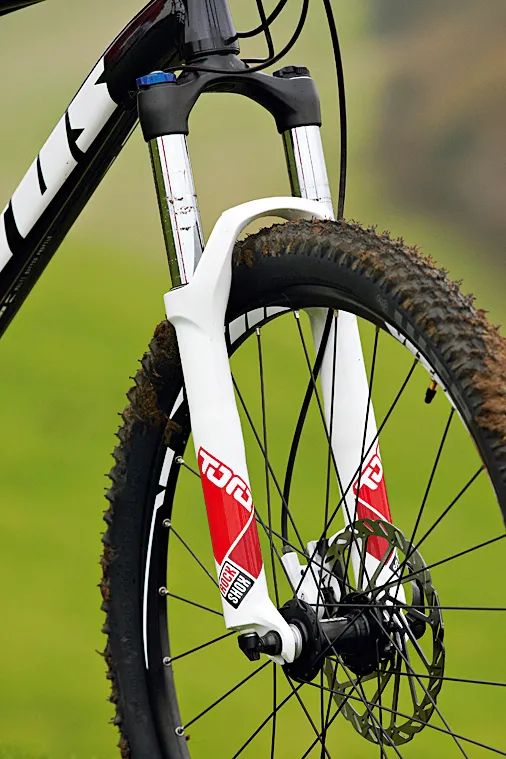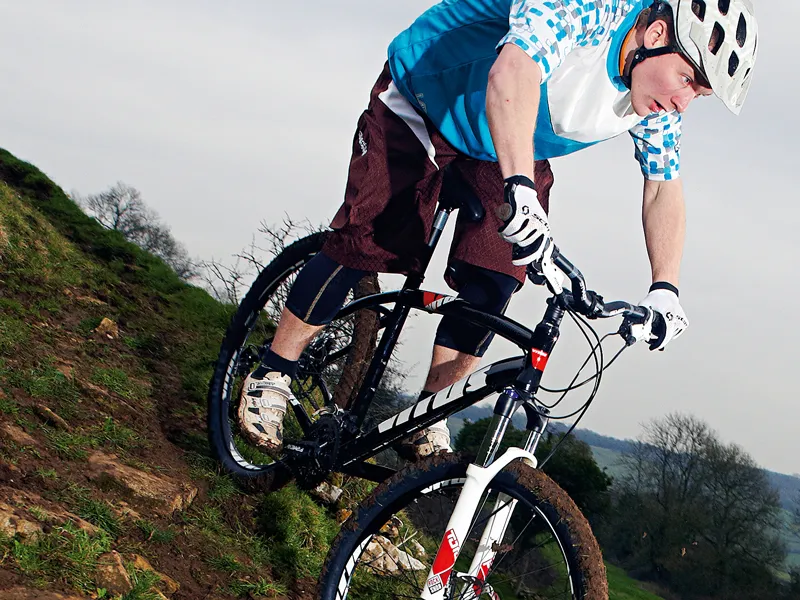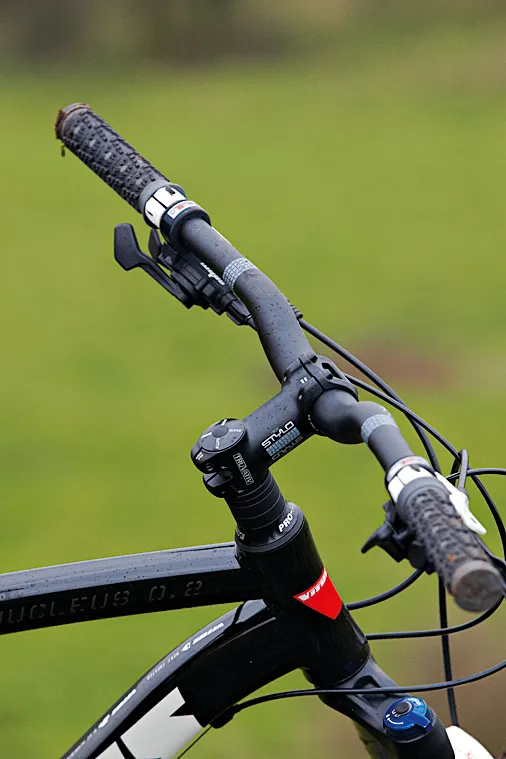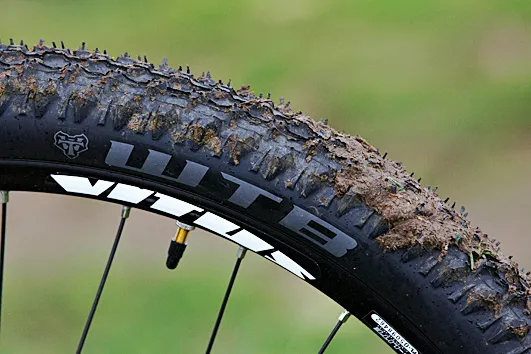Mountain bikers who’ve been around for a while might remember Irish road superstar Sean Kelly hammering his way to wins across the French and Belgian cobbles back in the days when the vast majority of frames were built from steel.
Kelly’s immense strength was certainly a factor in proving that aluminium frames were becoming a force to be reckoned with, and innovative French brand Vitus were among the first to profit from that. Fast-forward a generation, or more, and Vitus have been brought back to life by Chain Reaction Cycles.
The 0.2 is the more expensive of two well equipped Nuclei sitting at the base of a seven-bike range of very classy looking mountain bikes. The RockShox Tora TK fork is good on a bike at this price, and it has a decent wheelset and drivetrain too. Overall, it's a great bike for the money.
Ride & handling: At its best on technical trails
Tipping the scales at 13.3kg (29.4lb), the Nucleus isn’t the lightest of bikes at this price. But it makes up for that in other ways on the trail. It’s at its best on technical trails and at its weakest on long steady climbs, where you’ll wish for a longer reach.
If you’re looking for an aggressive bike that might relish the occasional race outing take a look at the next size up to get a longer top tube, or simply add a set-back seatpost and extra stem length. But that might be missing the point. The Nucleus is obviously designed to make difficult trails slightly easier.
The fact that it comes with a short reach, a fairly upright ride posture and a bit more fork travel than usual are all clues. It lives up to its promise as soon as the trail gets rough and/or technical, at both high and low speeds.
High profile grippy WTB Wolverine 2.2inch tyres add to both traction confidence and comfort, but they’re fast rolling tyres too so you only really notice the near 30lb bike weight on the climbs. Overall, a great bike for the money.
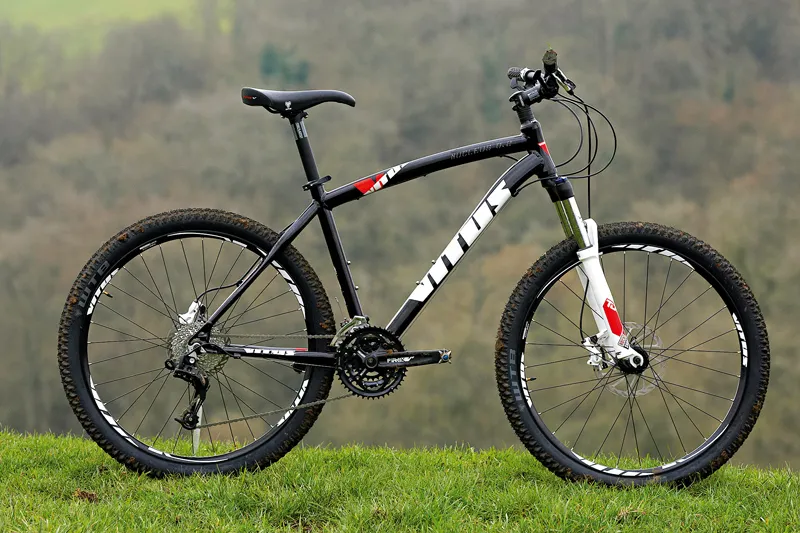
Frame: Classy French road heritage morphs into brave new forms
The Nucleus 0.2 has an interesting looking frame with a big handful of talking point aesthetics. With the exception of a round seat tube every tube has been manipulated in one way on another. The big down tube is almost box-section in profile, reinforced and curved behind the beefy head tube to make room for the fork to turn under it.
The ‘triangulated oval’ top tube curves along its whole length, with the rear brake hose routed along the left side. The seat and chainstays morph through several different shapes along their lengths, with curved sections for extra heel clearance and laterally ovalised sections in the centres presumably designed to help disperse some of the rear wheel impacts.
It’s a nice change to see under-down tube cable routing – despite the fact that it’s in the direct line of spray, it’s still the most efficiently direct in terms of gear shifts. There are two sets of bottle cage bosses and a quick release seat clamp.
Equipment: Boasts a no-compromise spec despite the quality frame & fork
The coil-sprung RockShox Tora TK fork is among the best performing options on bikes at this price. It’s fairly basic, not light and not as adjustable as an air-sprung fork, but the preload knob does have adjustments to suit most rider weights.
The compression is well controlled, rebound damping is adjustable and the lockout on top of the right leg leaves an ability to compress on unexpected hits if you forget to switch the lockout off. The 120mm (4.7in) of travel felt perfect in terms of ride height, but we struggled to achieve as much as 100mm (3.9in) even on the hardest hits.
You’ll find a few bikes with 10-speed cassettes around this price but check to see if there are downgrades elsewhere. The Nucleus drivetrain is a 27-speed offering but with no performance-sapping downgrades.
Truvativ’s Firex EXP cranks and SRAM’s gears are generally reliable, but the right hand shifter kept slipping on its ratchets – this has happened on a couple of SRAM’s X5 shifters we’ve had recently, and would be covered under warranty. Stopping duties are performed well by Avid Juicy 3 hydraulics with a big 180mm rotor up front for extra descending confidence.
We have no long-term durability experience of ProLite wheels, but these are well built and shod with WTB’s grippy fast rolling Wolverine 2.2in treads. A short Truvativ stem and 27in riser bar felt spot on for technical terrain and the WTB Pure V Sport saddle is comfy.
A few riders were wishing for a set-back seatpost, instead of the Truvativ inline one fitted, to get a little more stretch to the Truvativ Stylo bar on climbs. The 22.25in horizontal top tube length will suit some but it’s a full inch shorter than many other similarly priced 18in bikes.
